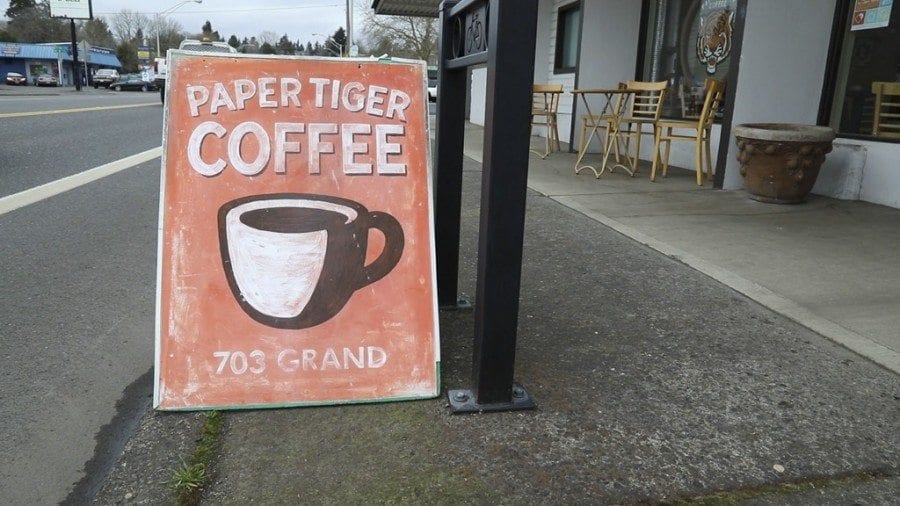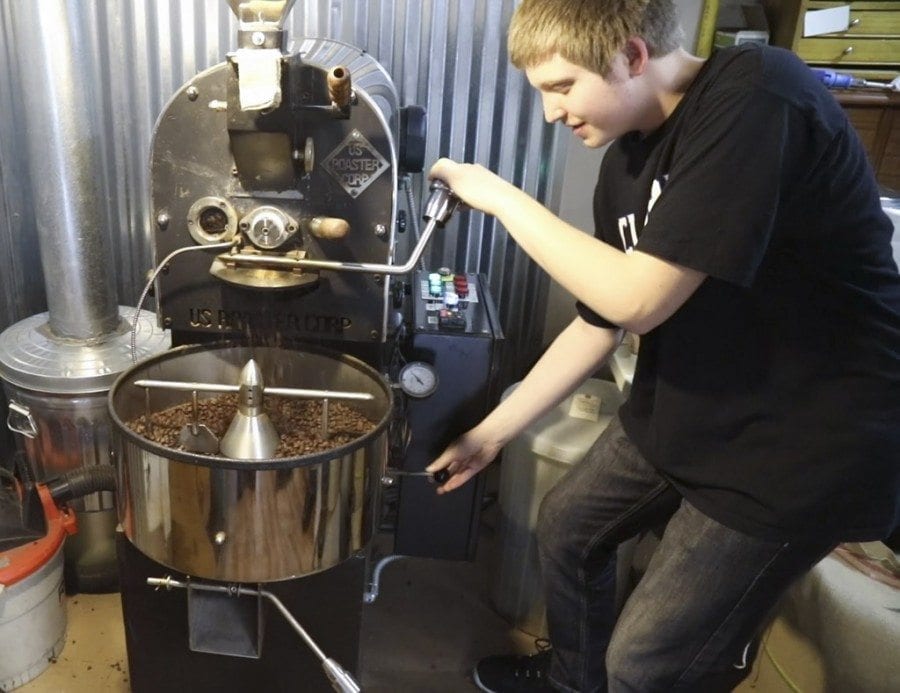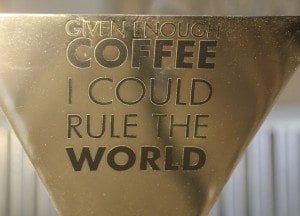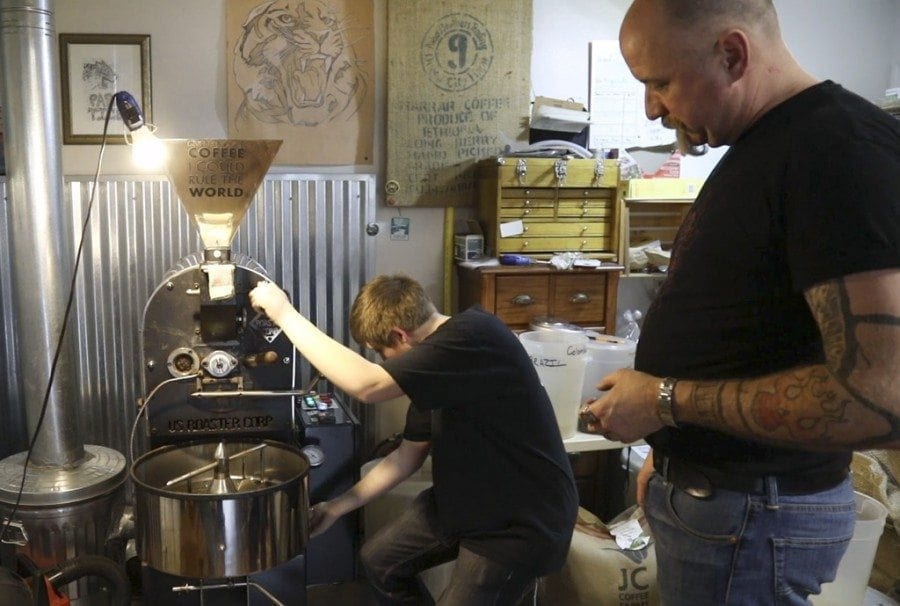VANCOUVER — When he was a young boy, Kenny Fletcher, owner of Vancouver’s Paper Tiger Coffee Roasters, used to travel from the Pacific Northwest to Arizona with his parents to visit his grandfather.
“We only got to go once a year,” Fletcher recalls. “But there was a coffee shop there and the lady who worked there never forgot my name. My grandpa was the town mortician, so people knew him. They’d talk about life, about the events of the week. There was fresh pie. It was nothing special, but I remember feeling really comfortable and welcomed there.”
When he purchased the business that is now Paper Tiger Coffee Roasters in 2011, Fletcher wanted to cultivate that same type of small-town, welcoming community feeling.
So when Steve Lowry, a teacher from the nearby Washington State School for the Blind approached Fletcher in 2012 with a favor, the community-minded coffee roaster didn’t hesitate.
“They had a roasting program at the school and Steve wanted to know if I could come and take a look at their machine,” Fletcher remembers. “Then we talked about having me teach the students how to roast (coffee beans). I remember thinking, ‘How do I teach a blind person how to roast?’”
About Paper Tiger Coffee Roasters
Who: Owners Kenny and Sue Fletcher
What: Locally owned and operated coffee roaster
Where: 703 Grand Blvd., Vancouver
When: Open 6:30 a.m. to 5 p.m., Mon-Fri; 7:30 a.m. to 2 p.m. on weekends
Why: Freshly roasted coffee and a welcoming, neighborhood feeling
Find them: On Facebook, on Twitter, on Instagram and on their website
As it turned out, teaching a visually impaired student to roast coffee wasn’t as big of a hurdle as it first seemed, Fletcher says.
“There were a few things I needed to do to make this work. So, we did a small fundraiser in the shop and raised $500 in just a few weeks from our customers,” Fletcher says. “I was able to buy a braille labeler and an auto thermometer that calls out the temperature.”
Fletcher takes on one new roasting apprentice from the School for the Blind each year and trains them on the basics of roasting and packaging coffee beans. Together, the coffee roaster and student create the shop’s seasonal Liger Blend — a smooth blend of Brazilian and Nicaraguan coffee beans with caramel notes that Fletcher calls “an everyman’s coffee.” Proceeds from the Liger Blend sales go back to the School for the Blind.
And Fletcher’s training keeps giving back to the school in other ways, too. Once the students have completed their typically yearlong, twice-a-week training at the coffee roastery, they take their new coffee-roasting skills back to the school and teach three or four other students how to roast beans on the school’s coffee roasting machine.

Some even take their new skills with them once they’ve graduated high school. In fact, one of Fletcher’s former roasting trainees — now an adult living in Idaho — has even applied for grants to help him open his own coffee roastery.
“The kids are great,” Fletcher says of the many students he’s worked with from the School for the Blind as well as the nearby Washington School for the Deaf, where students come to Paper Tiger to train as baristas. “Most of them come in pretty meek but within a couple weeks their confidence starts building and you can see that, by the time they’re finished, they’re ready to go out and get a job.”

There are, of course, exceptions to this rule. For instance, Fletcher’s most recent roaster-trainee, 16-year-old Jordan Raze, came into the program having already worked at several other places.

“This is my first time doing this type of job, but I’ve had other off-campus jobs,” Raze explains. “I also clean the fitness equipment at Clark College and used to clean equipment at the Marshall (Community) Center.”
Bad winter weather prevented Raze from starting his training in early January, as he’d planned, but now the sophomore has learned to make his own way from school to the coffee shop twice a week and has, after just a few days’ worth of training, taken to his new role like a pro, Fletcher says.
“He’s great,” Fletcher says, gesturing to Raze, who is busy showing visitors how the coffee roaster works and how he can manually check a notch on the scale to make sure he’s measured out exactly one pound of coffee beans when he’s packaging the freshly roasted Liger Blend. “He’s just jumped right in.”
Raze’s enthusiasm for his work is contagious. Within just a few minutes of talking to the young roasting apprentice, you want to know more about how the heat of the coffee roaster brings out different scents in the beans and what happens if you take a roast too far or pull it too soon.
“When it’s getting up to a certain temperature, around 375 degrees, you want to smell like a nice, butter smell,” Raze says. “So you smell for buttery toast first. And then you’ll smell the caramel.”
Finally, adds Fletcher when the two are roasting on the machine together, Raze will try to decipher a chocolate-nutty scent coming from the beans. Combined with the automated temperature and time cues, the young roaster will make sure that he stops the roast before the beans become over-roasted.

The students have sound and scent cues to help them with their roasting and, if they’re in a bind, they can read the braille labels Fletcher’s affixed to the machine’s critical switches. And, of course, Fletcher is always around to provide assistance should the students need help.
Once he’s finished his training with Fletcher, Raze says it should be pretty simple to figure out the School for the Blind’s coffee roasting machine and teach other students how to roast coffee for the school’s cafe.
“It will be so much easier,” Raze says. “I’d say I’m about three-fourths of the way to knowing that machine.”
Raze can tell you all about the coffee bean process and his roasting methods, but there is still one very important question that he has yet to answer: “Do you like coffee?”
The 16-year-old throws his head back in laughter.
“I don’t know! I still drink hot cocoa,” he says, still laughing. “But I might try a mocha.”
Fletcher jumps into the conversation.
“Yeah, we can make you a mocha. Get a little caffeine kick,” he tells his new apprentice.
“OK. Yes. I’ll do it,” Raze says. “Next time, I’ll try a mocha. See if I like it.”
Then he’ll try coffee?
“No,” Raze says, smiling. “I’ll probably stick with the mocha.”




